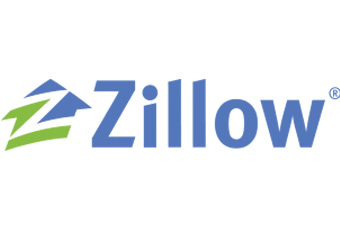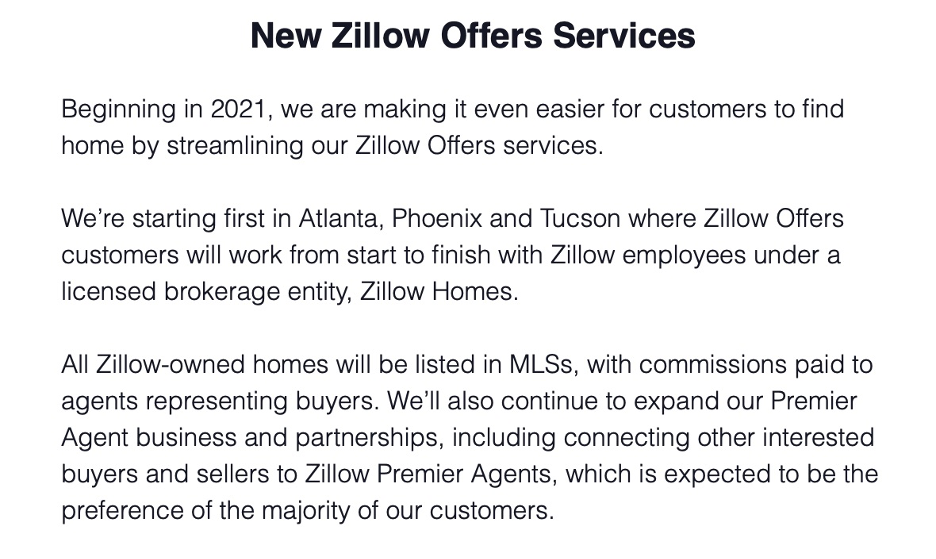In an announcement today – Zillow launched Zillow Homes, a licensed brokerage entity in Georgia and Arizona.
For years we heard that Zillow will never become a brokerage. Then when they became a brokerage to cover certain legal requirements in a number of states through acquisitions, we learned that it was simply air cover. Then Zillow began to collect referral fees from agents.
Completing the circle, today Zillow is a traditional brokerage, albeit for Zillow Offers. Who knows what tomorrow will bring? They have every right to operate as a brokerage and we welcome them with open arms.
What does this mean for Zillow compliance?
There is nothing wrong with Zillow operating as a brokerage, but you might be thinking – is Zillow.com or other Zillow websites in compliance with MLS rules and regulations. The answer is probably yes. In markets where they use an IDX feed, their display will need to be compliant. Like brokers who are in multiple MLS areas, they will display page layouts of properties sourced from the MLS according to those local display rules. With most consumer search on mobile today – it will be particularly uneventful for consumers. Basically, Zillow will remove a bunch of cluttered ad waste that makes their site unattractive anyway. I imagine that the new Zillow websites are likely to operate more like Redfin than Realtor.com. Probably not good news for either of those sites. Zillow may also have learned from Homesnap, the site of the Broker Public Portal, that MLS powered websites are more popular – Homesnap has passed every portal other than Zillow in leads generated to brokers.
Zillow gets data feeds of data from MLSs like other brokerages, but in most markets, it is not a broker feed nor is it a VOW feed or an IDX feed. It is something called a listing syndication feed – a feed comprised of listings which brokers have authorized the MLS to send to the Zillow websites – which are now broker websites in some states. It is not very different than sending listings to Realogy websites. Zillow can display syndication feed data however they like. It’s the IDX data that they need to handle differently.
As WAV Group was weighing in on changes to IDX policy this year, I could not help but to ask myself if IDX is necessary anymore. I can hear the voice of my friend Ken Jenny ringing in my ear – would BMW put Toyota cars on their website?
Back in the day when Edina Realty pulled their listings from Zillow and other syndication websites, I wondered if they would start a sea change. They didn’t. A few other large firms followed for a while, then the listings returned, driven by aggressive Zillow marketing directly to consumers whose listings were pulled. The consumer keeps the listings flowing to Zillow no matter how much the crowd of brokers and agents doth protest.
A few years ago we did research on HowardHanna.com – one of America’s largest firms and the largest family-owned firm in America. We learned that, like Zillow, home sellers asked listing agents if their listing was going to be on the broker website. At the time, HowardHanna.com had more consumer traffic in its core markets than Zillow, a position that has faded to second behind Zillow. At the time, I was endeavoring to imagine strategies that would allow Howard Hanna to remain at the top.
The best idea that I conjured for Howard Hanna was to drop out of IDX – which they did not do. My reasoning was that a powerful firm with about half the market share in their core markets at the time, did not need IDX in front of a password wall. The public property search on HowardHanna.com would search Howard Hanna listings only. There would be a call to action on the search results that would say “There are X more listings from other brokerage firms that match your search criteria, would you like to see those too?” If the consumer clicked, they would be launched into a VOW site with registration.
This was not my idea, but rather a proven lead generation strategy developed by IDX and VOW pioneer Wolfnet during the days of selective IDX in the Chicago MLS area. What WAV Group learned by studying the IDX/VOW combo is that it drove massive improvements in lead generation. Wolfnet put lead gen nuggets in many places – “Would you like to see days on market?”; “Would you like to see recently sold listings in this area?”; “There are x number of exclusive listings that match your search, would you like to see those?”
It’s tragically funny to recognize that when you visit most brokerage IDX sites today, there is no button to “View Our Listings.” But imagine the benefits of brokerages who go the other way, drop IDX all together. Invite other brokers to send them their data just like they send them to Zillow. No rules, no compliance.
Zillow Homes has reimagined home search in so many ways. Now they have found a way to master it through deregulation of MLS listing management by skipping IDX whilst maintaining the accuracy, comprehensiveness, and timeliness of MLS data feeds. Fascinating.
Zillow is pro-MLS – putting their listings in the MLS and offering compensation to other members. They are also doing the MLS a huge favor by creating a conduit for builders to list in the MLS in order for their listings to appear on Zillow.
With every sea change in real estate, there is a reaction. If you are a large firm or a franchise who would like to mastermind some new paths forward, contact WAV Group. There are boundless options. America’s largest real estate company in terms of Wall Street valuation has made its move. What’s yours?





Hi Victor, thanks for the article!
Forgive me for being slow on the pickup but I have a question about the following paragraph in your post above:
“Zillow Homes has reimagined home search in so many ways. Now they have found a way to master it through deregulation of MLS listing management by skipping IDX whilst maintaining the accuracy, comprehensiveness, and timeliness of MLS data feeds. Fascinating.”
…what I don’t get is that in Zillow’s announcement and in Errol’s video, Zillow has said they are switching from direct feed to IDX…but in the above graf you say “skipping IDX..” what am I missing?
Zillow was getting feeds from third party data aggregators like Listhub, Realogy, etc. The data accuracy was about 60% (see WAV Group Research). A few years ago, they switched to MLS Only syndication feeds (with New Homes being the hold out because they were unlikely to be in the MLS). With MLS only feeds, they improved the speed and accuracy of the data on their site – updating though syndication at the same rate as updating though IDX. It may not have been the most complete data set because of the broker Opt-In, but I would deposit that they were well into the mid to high 90% of active listings on their site. Now they are going a step further – MLS only feeds as a broker and a member of your AOR. Basically, Zillow will have a data set like Realtor.com, Redfin or EXP. They will sell their inventory and refer consumers in markets where they do not have agents. It will take awhile for this transition to happen, but I am sure that Zillow has lined up a few hundred staff members to join the MLS. And, remember, through their data aggregation group – they are already ingesting the IDX feeds in most of the US MLS markets. Give me a call if you would like to discuss further.